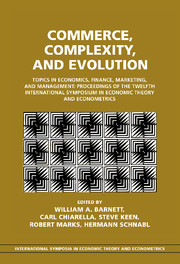 Commerce, Complexity, and Evolution
Commerce, Complexity, and Evolution Book contents
- Frontmatter
- Contents
- Series editor's preface
- Volume editors' preface
- Editors
- List of contributors
- I Philosophical and methodological implications of complexity and evolution in economic systems
- II Finance and the macroeconomy
- 5 The nonlinear economics of debt deflation
- 6 The emergence of complex dynamics in a “naturally” nonlinear integrated Keynesian model of monetary growth
- 7 Stochastic volatility in interest rates and complex dynamics in velocity
- 8 A genetic-programming-based approach to the generation of foreign-exchange trading models
- 9 Hybrid option pricing with an optimal weighted implied standard deviation
- III Market and sectoral dynamics
- IV Marketing and interdependent behavior
5 - The nonlinear economics of debt deflation
Published online by Cambridge University Press: 05 December 2011
- Frontmatter
- Contents
- Series editor's preface
- Volume editors' preface
- Editors
- List of contributors
- I Philosophical and methodological implications of complexity and evolution in economic systems
- II Finance and the macroeconomy
- 5 The nonlinear economics of debt deflation
- 6 The emergence of complex dynamics in a “naturally” nonlinear integrated Keynesian model of monetary growth
- 7 Stochastic volatility in interest rates and complex dynamics in velocity
- 8 A genetic-programming-based approach to the generation of foreign-exchange trading models
- 9 Hybrid option pricing with an optimal weighted implied standard deviation
- III Market and sectoral dynamics
- IV Marketing and interdependent behavior
Summary
1933 was a pivotal year for economics. Practically, it marked the perigee of the Great Depression – although no end was yet in sight to capitalism's greatest slump. Academically, it saw a bifurcation in economic theory, with two leading economists presenting diametrically opposed interpretations of the cyclical nature of capitalism. In one view, cycles – even, it seems, great depressions – were caused by exogenous shocks to an otherwise stable economic system. In the other, cycles were endemic to capitalism – and indeed, capitalism harbored a tendency toward complete collapse.
The former view was put forth by Frisch in his celebrated and well-known paper “Propagation problems and impulse problems in economics” (Frisch 1933); the latter was put forth by Fisher in his much less well-known paper “Debt deflation theory of great depressions” (Fisher 1933a). The former paper is credited with playing a key role in the development of the then fledgling subdiscipline of econometrics; the latter remained largely ignored until its revival, among the underworld of economics, in the form of Minsky's “Financial instability hypothesis” (Minsky 1977). In this chapter I argue – with the benefit of nonlinear hindsight – that the majority of the profession took the wrong fork back in 1933.
Frisch's linear premise
Frisch's initial premise was that “the majority of the economic oscillations which we encounter seem to be… produced by the fact that certain exterior impulses hit the economic mechanism and thereby initiate more or less regular oscillations” (Frisch 1933, p. 171).
- Type
- Chapter
- Information
- Commerce, Complexity, and EvolutionTopics in Economics, Finance, Marketing, and Management: Proceedings of the Twelfth International Symposium in Economic Theory and Econometrics, pp. 83 - 110Publisher: Cambridge University PressPrint publication year: 2000
- 10
- Cited by
